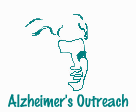 As Memory Fades.....
As Memory Fades.....
The Caregivers Challenge Begins
 As Memory Fades.....
As Memory Fades.....
The Caregivers Challenge Begins
Click HERE to print out plain text version
Fatigue
The biggest
enemy of the person with memory loss is fatigue. People with brain diseases
tire very easily -- because they have to concentrate so hard all the time.
Try the following suggestions to prevent fatigue:
Give the person a rest both in the morning and the afternoon. This may
be just a quiet period or an actual nap. If the person naps, have him/her
sleep in an easy chair or the sofa so they know when they wake up that
the rest period was a nap -- that it is not morning all over again!
If the person
is waking at night DO NOT keep them up all day. Forcing them to stay up
all day can make the night wakening worse!
Avoid foods and
beverages with caffeine.
Try decaffeinated
coffees, teas, colas, and pops containing no caffeine
If you are planning
a social activity or trip, make sure the patient is well-rested both before
and after the trip. Many families make the mistake of trying to accomplish
too much during a day. Travel for a while, then stop and rest.
Get to know the patient's "best time of day."
Use that time
to visit friends, go to the doctor or dentist, or travel Plan activities
that are of a shorter duration. Instead of cleaning the house in a single
day, spread the chores across several days to prevent the person from becoming
overtired.
During holiday
gatherings or special occasions such as weddings or reunions -- when the
person is away from home -- plan in advance a place and times when he/she
can get away to rest during the activity. Many patients go through a period
where they sleep a great deal.
If this happens,
check for depression or boredom. If neither is present and the person is
still sleeping at night, understand it is normal for the illness. This
is a good time for you, the caregiver, to get things done, catch up on
your rest, or indulge your own interests.
Supported by: Iowa Scottish Rite Masonic Foundation,
National Caregiving Training Project,
University of Iowa College of Nursing,
Gerontology Nursing Intervention Center
Research Development and intervention Core
Developed by: Geri R. Hall, Ph.D., ARNP, CNS
Gerontology Clinical Nurse Specialist
Mayo Clinic Scottsdale
13400 E. Shea Boulvard
Scottsdale, Arizona 85259
Phone: 602-301-8111
E-Mail: Hall.Geri@mayo.edu

Hope our logo helps you find your way back to us.